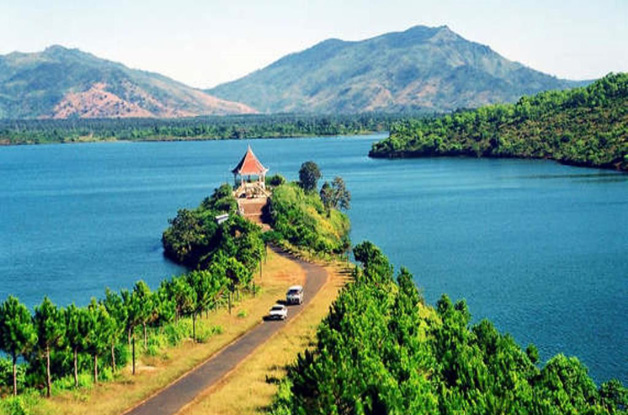Central Highland

CENTRAL HIGHLANDS OF VIETNAM
The Central Highlands encompasses beautiful natural features such as relatively
untouched forests, waterfalls and spectacular scenery. These do contrast with
some sites in the area that exhibit some savage scars of the War. The Central
Highlands's population comprises a large number of ethnic minority groups who
still live in their traditional lifestyles. These tribes can be visited around
Kontum, Pleiku,
Buon
Ma Thuot, and
Dalat.
During the monsoon season, the highland region becomes a torrent of water as
this area is the subject of some of the heaviest rain fall in all of
Vietnam.
During the summer season, Dalat becomes a popular destination because of the
fact that high altitude offers a slightly cooler temperature than the almost
unbearable humid heat of the southern plains. This cool weather factor combined
with its proximity to
Ho Chi Minh City (Sai gon) has made Dalat the epicenter of
domestic tourism during that time of the year.
The Central Highlands is a good place to go for those who enjoy getting off the
beaten track. It is quite easy to include this region as part of a circuit by
way of leaving the coast leaving and returning through either Qui Nhon or Nha
Trang. You can take a separate excursion to reach Dalat from either Phan Rang or
Ho chi Minh City. You will need to allow enough time for traveling across the
narrow and bumpy roads, especially between Buon Ma Thuot and
Nha Trang If you
want to fully visit all of the region and really get to know it and explore its
significant historical meaning, it will take you two weeks. On the other hand,
one week will allow you to familiarize yourself with the bare essentials of the
region.
Kontum
Kontum is a small town siting in the middle or in proximity of several ethnic
villages. This town was also the site of some major battles during the conflict
with the Americans. Even today, decaying weapons and shells abound. One of he
places that you should visit is Pleiku. It has a large friendly indigenous
population and can be visited on foot from Kontum. Because of the necessity to
access this village on foot, as a result they have had limited exposure to
tourism and they are still happy to see foreigners. On the road you will get a
be able to see some of the traditional houses built on stilts. There are also
some waterfalls further out of the town that can be visited by motorbike.
The highland area was only opened up to tourism in mid 1994 and the police here
can still be a bit touchy. If you are going to wander around the surrounding
areas, better to do it with a guide as they will ensure that the police are
aware and agree to your excursion. Another danger in walking in the countryside,
away from a town, is that there is still a large amount of left over ordnance
from the War. So be careful!
The best thing to do if you should be in Kontum is to go for a walk or hike
around the surrounding area. You can easily keep yourself busy for a day or two
thoroughly enjoying the sights. There are still many traditional hill tribe
villages in and around Kontum, and the best way to visit these is with a guide.
Kontum is still a fairly small town and is not too popular on the tourist trail.
Seminary
One site worth seeing in Kontum is the seminary. The seminary was built over 80
years ago and is still looked after by a small group of priests. The building is
still in quite good condition and has a grove of cherry blossoms in the front
yard.
Churches
On Nguyen Hue street, there is a large church which is over 120 years old and is
in the process of being renovated. This church has beautiful stained glass
windows. Beside the large church is the Montaguard church, called a Rong House.
This church is over 100 years old. It is easy to recognize by its extremely
steep thatched roof, and is set about 2 m above the ground. The Montaguard
church is entered by the tribe people only once a year. Also in town is a French
Cathedral that is worth a visit. It is white in color but is streaked with black
as if it had survived a fire.
Pleiku
Pleiku is a town with a large ethnic population. It sits at the junction of
roads leading to Kontum, Buon Ma Thuot and Qui Nhon. This town was almost
totally destroyed during the Vietnam war as it was the home of an American base.
If you expect to be here during the monsoon season, you should know that Pleiku
boasts the highest rainfall in the Central Highlands.
One thing worth seeing in Pleiku, are the Jarai and Bahnar tribes that live
close by. The Jarai built houses on stilts with an additional small hut at the
front to store the much needed rice. The Bahnar also built their houses on
stilts and have added large balconies to work on while at home. They have a
community building called a Rong House where the elders meet for ceremonies and
festivals. Inside the Rong House one can find gongs, wine, drums and all the
precious ceremonial artifacts. Shaman also use this large building for spiritual
rituals such as the 'prayer for rain'. The Rong House can only be entered by
men.
The tombs of these tribes are also very interesting. By tradition little thatch
wooden huts are set over the tomb in which the possessions of the deceased are
placed. Around the tomb there are four wooden pillars. On top are wooden
carvings of men or monkeys that stand guard in order to protect the body of the
deceased. The burial ceremony is very expensive. If the family of the deceased
cannot afford it at the time of the passing away, the funeral party can be
postponed up to three years later.
When there is a burial ceremony, the entire village population spends three days
at the burial site and a water buffalo is ceremonially sacrificed and
subsequently used to feed the village population. The head of the water buffalo
is cut off and hung on the tomb, and the four hooves are cut off and placed on
the four corners of the grave
Yaly Waterfall
There is a waterfall that you can visit 15 km north of Peiku on the road to
Kontum. You will come across a major intersection on the road where you make a
left turn and continue to the end of the road.
Former Battlegrounds
There are number of former battlegrounds which can be visited from Pleiku
including Ham Rong Mount, Plei Me post and the former 1st Cavalry Division base
at Hon Chong (in An Khe district)





